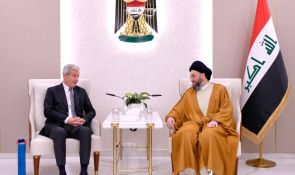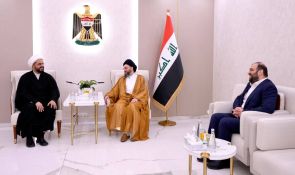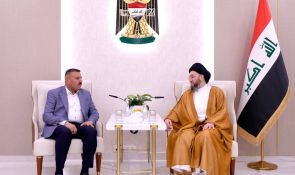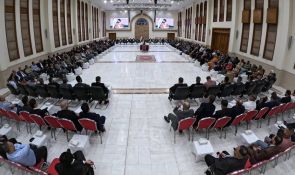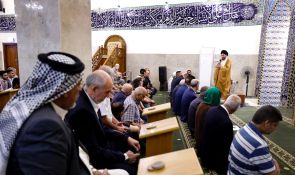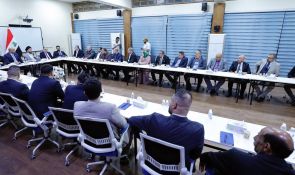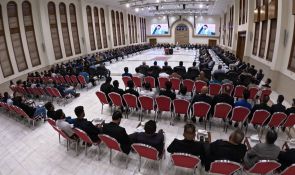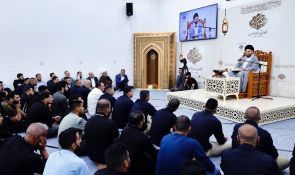SAYYID AMMAR AL-HAKIM: “Ignoring and neglecting partial details does not mean ignoring mistakes and attacking others’ rights.”
In past weeks, our talk was about the Islamic theory of command and administration. We mentioned the covenant of Ameer al-Mu’mineen (Ú) to Malik al-Ashtar when he installed him as governor of ruler as being a sum-up of this theory. We reached the eighth section of this covenant and important historic document in which the Commander of the Faithful talks about the advisors and their characteristics: When choosing his advisors, an official must notice these features and characteristics in these advisors so the project may be successful, and so these advisors will not have negative characteristics and features that prevent them from being a means, a support and strength for the official that cause the failure of the leadership mission and foil the official’s efforts to reach the anticipated outcome.
An official must overlook minor things and partial details…
Here, we reach another feature of those of the advisors as exists in this sacred covenant where the Commander of the Faithful (Ú) says, “Overlook anything which is not quite clear to you,” anything which does not appear to you. O official! The matter that does not appear before you, the minor mistakes or marginal issues, whatever simple abuses which some people may commit against the state or the official himself, do overlook them. The official must overlook these mistakes in which people may fall, the details and particles that are not quite clear or obvious. A legal violation may once take place or a witnessed crime may take place before you. Something may take place as witnesses look on, before people’s eyes, and this is something else. The talk about unclear matters must be overlooked by the official.
Believing scandal-mongers leads to loss of responsibility and the chance for leading the mission…
“Do not hasten to believe an interest-seeker.” The interest-seeker here is the backbiter. Do not hasten, O official, to believe what backbiters, scandal-mongers and those who carry the reports to you. Do not rush to judge and believe vendetta reports which may later prove to be untrue and you will then have to apologize. “A scandal-monger cheats though he assumes the role of advisors.” It is the nature of a back-biter to cheat. People behind reports cheat you even if they appear to you as being advisors and caring. You must not build on these folks’ reports. This will lead to the loss of responsibility and the opportunity to lead the mission of which you take charge. Though short, these statements provide an important lesson in life. One must adorn himself with open-mindedness and with insight rather than stop at petty issues. His thinking must be broad, and he must be big…
He looks at matters with piercing eyes, overlooking small details and partial things. The official must look at the directions of the compass from the right angle. As for the rest of partial details, the chit-chat, nobody should stop at them till the leadership mission succeeds, development and progress take place in the leadership duties, whatever they may be.
Open-mindedness, dealing rationally, with clemency and self-control and not going after personal sentiments as well as awarding priority to the public interest in the leadership mission…, this is a big lesson from Ali (Ú).
Being immersed into the details will leave a negative impact in the soul of the official. Ultimately, he sees himself isolated from his society and subjects. Being interested in minor issues which is done by everyone will get the official to be isolated even from the people who are the closest to him. Monitoring the details will foil the command mission.
An official must keep in mind the big goals and overlook the particularities and minor issues. Ali (Ú) says in Tuhaf al-Uqool, “Do not be so precise with people as though weighing one scale against another.” Do not deal with people according to the smallest measure. Do not stop at snapshots. “And magnify your status by overlooking lowly matters.” Raise your status and value; as for the lowly, simple and partial matters, leave them, overlook them.
In Vol. 2 of Ghurar al-Hikam book, we read that “Half a wise man is toleration: toleration and open-mindedness. And half of it is overlooking.” Overlook the particularities, the tiny particles. An official must keep in mind the major issues, the destiny-making matters, the big goals of his leadership’s mission. The cabinet minister must look after his ministry’s matters and about serving the citizens.
In Vol. 6 of Ghurar al-Hikam, the Imam ((Ú says, “There is no clemency greater than overlooking.” One is clement when he overlooks minor details. “Nor is there reason greater than pretending not to know.” A wise man’s wisdom lies in ignoring particularities and detailing mistakes.
In Vol. 5 of Ghurar al-Hakim, the Imam ((Ú also says, “One who does not overlook and ignore many matters, his life will be unpleasant.” Paying attention to small things, to chit-chat, and monitoring the nitty and the gritty brings insomnia to the official, turning his life into misery. He loses his ability and comfort; he is distracted from the basic mission of serving those about whom he is responsible.
Overlooking and ignoring petty things is evidence of conduct’s straightforwardness, a proof of the strength of the leadership mission, a proof of precise identifying in order to understand the priorities in paths. On p. 222 of Nahjul-Balagha, it is written that “The best of a good person’s deeds is to overlook what he does not know.” An official here tries to overlook mistakes and minor negativities. Such is the program and the path in administration and leadership. Here I direct my call to the father and the mother, heads of the family, and say: Do not hold your children accountable for petty matters so long as they are on the right track. Small matters carry several meanings and concepts. In the family, they are not the same as they are in the big state. We must look at the matters according to what they are. Some people see that ignoring and overlooking these particulars is a weak evidence, and an official may say: “How can I be responsible if I do not know and realize what takes place in my office, if I do not spread spies to watch people everywhere? Who says that this is an evidence of strength?” Who says that overlooking is an indication of weakness? Overlooking and ignoring small things is evidence of a conduct’s straightforwardness and a proof of the strength of the leadership mission, an evidence for the precise identifying in order to comprehend the priorities, what tops leadership paths. The evidence is that you know where the direction of the compass is, and you do not let others control you. You have a big mission which you should steer in the right direction. So, overlooking and ignoring is evidence of strength, not of weakness.
In Vol. 71 of Bihar al-Anwar, Ali ((Ú is quoted as having said, “The best of attributes of goodness is that you overlook what you know.” A man of dignity among his people is adorned by the best qualities of goodness: overlooking. It is evidence of strength. It is putting an effort where it belongs rather than paying attention to what is trivial, to other detail particles. But it must not be understood that ignoring and overlooking petty things as well as partial details means ignoring mistakes, violating the law, trespassing on the rights of other citizens and violating sanctities. The injustice that is inflicted on people must not be taken lightly or one remains silent about it. Injustices harm citizens, people are abused…, these maters cannot be ignored. Mistakes towards and violations of the law, abusing the rights, are things where one should stop and treat and not permit such paths to be undertaken openly, so much so that a citizen will fear for himself, his security and rights. These matters are not petty, nobody should overlook them. These matters must be examined because they are connected to the essence of the leadership mission. Also, there are reasons for doubt which must be examined. Nobody should rush to hold others to account. You may hold to account a man of integrity and honesty who does not bargain, who defends people’s rights. There are opportunists who do not like the doing of what is right. Assaults, violating the law, breaking the prestige of the state require a strict stance, whereas details, particularities, vendetta reports and mischief-making require attention and wisdom.
The Messenger of Allah (Õ) is quoted as having said, “Restrict yourselves when it comes to doubts so you may not be unjust to people.” No measures can be undertaken regarding accusations, suspicions and claims. One can be jailed unfairly, so he loses his job, then he is released after several months; this is not right. Who would bear all this financial and moral suffering of that individual? Following suspicions, charges and taking it lightly to accuse people is a very serious matter. Assaults, violations of the law, breaking the prestige of the state require a strict stance. Details, particularities, vendetta reports and mischief-making require taking the time and being wise in dealing with them.
Keeping slanderers, backbiters and writers of vendetta reports away…
Those who slander and bad mouth others must be kept away because they abuse the official, cause embarrassment to him and make him always angry with others and living in a trust crisis with others. Allah Almighty says the following in Surat al-Qalam: “Do not heed any despicable man who is ever-ready with oaths, a slanderer who goes about with calumnies” (Qur’an, 68:10-11).
Although he swears by the greatest oaths, do not obey or listen to this slanderer who tries to keep you away from the society in which you are; do not bring him close to you so you may achieve success.
The Messenger of Allah (Õ) is quoted as having said, “Beware of calumny.” One who speaks ill to you will speak ill of you some other day. Calumny is a dangerous virus: “One who is guilty of calumny shall never enter Paradise.” Do not trace people’s slips and do not let people trap each other. Paradise is not the place for those who promote calumny. This is what the Messenger of Allah (Õ) says.
In his book titled Al-Ikhtisar, mentor al-Mufid says that a man went to the Commander of the Faithful (Ú) to tell him that there were those who were speaking ill of and assaulting him. Ali (Ú) answered him saying, “Man! If you were truthful in what you say, we would hold you in contempt,” that is, “If what you say is the truth, I still despise you.” Ali (Ú) did not permit anyone to quote others and to detail their personal mistakes to him even if they were true because this can cause hostilities and grudges. “And if you were lying, we would punish you. But if you would like us to overlook what you have done, we would do it.” Ali (Ú) put these options before the man. If he wanted to withdraw his vindictive report, Ali (Ú) would forgive and overlook. This man hoped that Ali (Ú) would reward him for reporting people’s mistakes towards his person, and he would get privileges, but he got the opposite. He said, “Overlook what I have done, O Commander of the Faithful!” He wanted forgiveness and overlooking, taking back his report and slander. Calumny leads only to hatred, enmity and hostility. The official must not stop at minor issues and small mistakes of the subjects; such was Ali’s upbringing, peace with him.
Tarrying and not rushing to accept calumny and its consequences…
In Ghurar al-Hikam book, Ali (Ú) says, “Beware of calumny, for it plants grudge and keeps one distantly from Allah and from people.” Hatred, hostility and dispute are the effects of slandering. Slander keeps people away from Allah because a slanderer adopts a position which does not please Allah. It also keeps one distantly from people because it creates disputes among people.
In Vol. 71 of Bihar al-Anwar, Ali is quoted as having said, “Beware of slanders, for they bring about grudges.” We plead to Allah Almighty to avoid it and to keep us bringing people closer to us, to consult with people, they provide us with advice for the sake of goodness, bringing us closer to others rather than keeping us distant from them.


